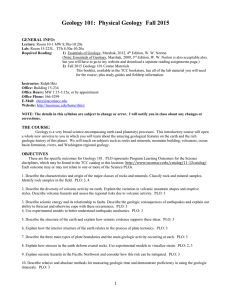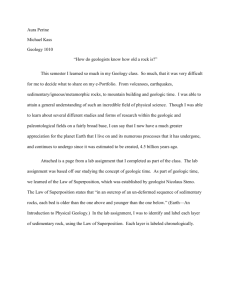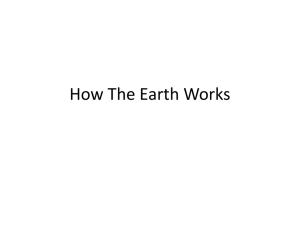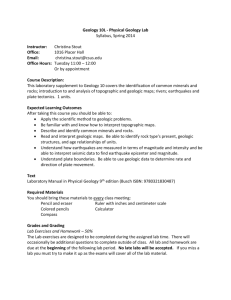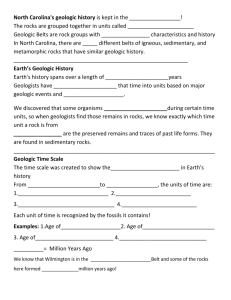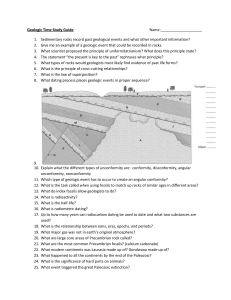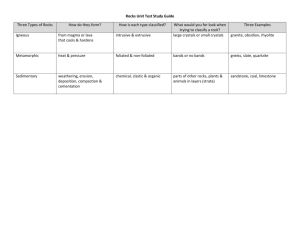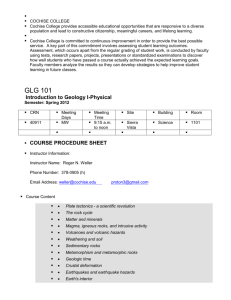course objectives/outcomes
advertisement
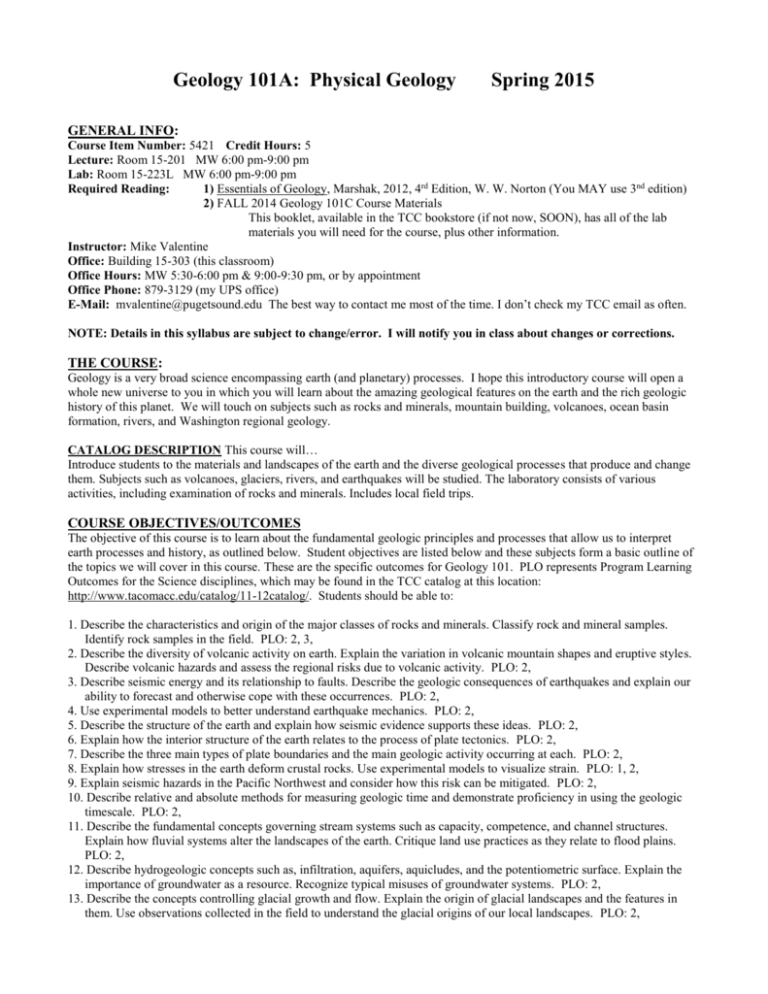
Geology 101A: Physical Geology Spring 2015 GENERAL INFO: Course Item Number: 5421 Credit Hours: 5 Lecture: Room 15-201 MW 6:00 pm-9:00 pm Lab: Room 15-223L MW 6:00 pm-9:00 pm Required Reading: 1) Essentials of Geology, Marshak, 2012, 4rd Edition, W. W. Norton (You MAY use 3nd edition) 2) FALL 2014 Geology 101C Course Materials This booklet, available in the TCC bookstore (if not now, SOON), has all of the lab materials you will need for the course, plus other information. Instructor: Mike Valentine Office: Building 15-303 (this classroom) Office Hours: MW 5:30-6:00 pm & 9:00-9:30 pm, or by appointment Office Phone: 879-3129 (my UPS office) E-Mail: mvalentine@pugetsound.edu The best way to contact me most of the time. I don’t check my TCC email as often. NOTE: Details in this syllabus are subject to change/error. I will notify you in class about changes or corrections. THE COURSE: Geology is a very broad science encompassing earth (and planetary) processes. I hope this introductory course will open a whole new universe to you in which you will learn about the amazing geological features on the earth and the rich geologic history of this planet. We will touch on subjects such as rocks and minerals, mountain building, volcanoes, ocean basin formation, rivers, and Washington regional geology. CATALOG DESCRIPTION This course will… Introduce students to the materials and landscapes of the earth and the diverse geological processes that produce and change them. Subjects such as volcanoes, glaciers, rivers, and earthquakes will be studied. The laboratory consists of various activities, including examination of rocks and minerals. Includes local field trips. COURSE OBJECTIVES/OUTCOMES The objective of this course is to learn about the fundamental geologic principles and processes that allow us to interpret earth processes and history, as outlined below. Student objectives are listed below and these subjects form a basic outline of the topics we will cover in this course. These are the specific outcomes for Geology 101. PLO represents Program Learning Outcomes for the Science disciplines, which may be found in the TCC catalog at this location: http://www.tacomacc.edu/catalog/11-12catalog/. Students should be able to: 1. Describe the characteristics and origin of the major classes of rocks and minerals. Classify rock and mineral samples. Identify rock samples in the field. PLO: 2, 3, 2. Describe the diversity of volcanic activity on earth. Explain the variation in volcanic mountain shapes and eruptive styles. Describe volcanic hazards and assess the regional risks due to volcanic activity. PLO: 2, 3. Describe seismic energy and its relationship to faults. Describe the geologic consequences of earthquakes and explain our ability to forecast and otherwise cope with these occurrences. PLO: 2, 4. Use experimental models to better understand earthquake mechanics. PLO: 2, 5. Describe the structure of the earth and explain how seismic evidence supports these ideas. PLO: 2, 6. Explain how the interior structure of the earth relates to the process of plate tectonics. PLO: 2, 7. Describe the three main types of plate boundaries and the main geologic activity occurring at each. PLO: 2, 8. Explain how stresses in the earth deform crustal rocks. Use experimental models to visualize strain. PLO: 1, 2, 9. Explain seismic hazards in the Pacific Northwest and consider how this risk can be mitigated. PLO: 2, 10. Describe relative and absolute methods for measuring geologic time and demonstrate proficiency in using the geologic timescale. PLO: 2, 11. Describe the fundamental concepts governing stream systems such as capacity, competence, and channel structures. Explain how fluvial systems alter the landscapes of the earth. Critique land use practices as they relate to flood plains. PLO: 2, 12. Describe hydrogeologic concepts such as, infiltration, aquifers, aquicludes, and the potentiometric surface. Explain the importance of groundwater as a resource. Recognize typical misuses of groundwater systems. PLO: 2, 13. Describe the concepts controlling glacial growth and flow. Explain the origin of glacial landscapes and the features in them. Use observations collected in the field to understand the glacial origins of our local landscapes. PLO: 2, GRADING: Grading will be based on the criteria below. The course grade will be determined by adding the percentages from each of the categories below. A simple, straight percentage scale will then be used to assign course grade: 100%92.5% is an A, 92.5%-90% is an A-, 90%-87.5% is a B+, 87.5%-82.5% is a B, 82.5%-80% is a B-, 80%-77.5% is a C+, 77.5%-72.5% is a C, 72.5%-70% is a C-, 70%-67.5% is a D+, 67.5%-62.5% is a D, less than 62.5% is an E). NOTE: D- is no longer an option! Rock & Mineral Quiz Homework & Attendance Oral presentation Exam I Exam II Exam III (somewhat comprehensive) Labs 10% 9% 14% 14% 14% 14% 25% Rock & Mineral Quiz This quiz is based on hand specimen identification and will be given during lab time. The specimens are rocks that will be covered during the first three labs. Students are responsible for both identifying each rock or mineral by name and discussing the origin of the specimen. I will provide a list of rocks and minerals you will be responsible for. Homework & Attendance There will be a few assignments, the most prominent being 2 geologic scrapbooks. They require you to find pictures and news-type stories related in some way to the topics we will cover this quarter. You will provide expanded background geologic information on these as budding geologists. Instructions for these will be provided separately. Excessive absence will be penalized. Oral presentation This is a presentation to the class on a topic of your choice. Depending on how many student we end up with and scheduling, these may be done in pairs or solo- I’ll let you know by the 2nd week of classes. Expect to put in a good amount of time and effort on this project. I will be monitoring your progress and I may require a meeting with me prior to your presentation. This presentation is worth 14% of your final grade- MORE than each of the first 2 exams, so work HARD on this. If you follow instructions and meet all deadlines for this project, you will do well on this presentation! You MUST present your work to the class in order to pass this class; if you miss your presentation, you will NOT pass the course. Exams The exams will cover both lecture and reading material. Materials in the labs may appear on the exams but only if it is information that is redundant with the lectures and reading. No make up exams will be given unless you discuss it with me beforehand. Exams will include a variety of question formats such as diagrams, matching, true/false, the standard multiplechoice questions, fill-in-the-blank, and/or short answer. You may have to draw a picture or two. Labs The lab grade will be based on completed lab work. The exercises are designed to reinforce the content and concepts covered in the lectures and reading. CLASS POLICIES: Assignments Late work will have 20% of the score deducted per class until there is nothing left. No late work will be accepted if I have already graded and returned the assignment to the rest of the class. Please understand that I must act on behalf of the students in the class who complete their assignments on time. Field trips One extra credit field trip will be offered on a week-end day. Dress appropriately and wear sturdy shoes. Also bring notetaking materials. See the Course Materials booklet for more information about the field trip. Withdrawals and Incompletes October 3rd is the last day to drop this class with no grade reported. November14rd is the last day to withdraw from the course with a grade of “W.” Under appropriate circumstances students may obtain an incomplete for the course. This option requires that the student fulfill the remaining requirements within a designated amount of time. Attendance There is a high correlation between lecture attendance and course performance. If you do not regularly attend lecture it is very unlikely that you will do well in the course. The opportunity for personal interaction with the instructor is invaluable. In addition, poor attendance will affect the Homework/Attendance portion of your grade. Lab attendance is mandatoryattendance WILL be taken for class and labs. In order for you to receive credit for a lab you must attend. There are no make-up labs. Because the labs are an integral part of the class, more than ONE UNEXCUSED, missed lab can result in a failing grade for the entire course. EXCESSIVE ABSENCE/LATENESS- As I state above, I will take attendance every class. If you are 10-35 minutes late, or leave 10-35 minutes early, you will receive 1 attendance point. If you are more that 35 minutes late, leave more than 35 minutes early, or are absent, you will receive 2 attendance points. If you accumulate 10 attendance points (You have essentially missed 25% of classes), your final grade drops by one letter. If you accumulate 12 or more attendance points, you will receive a failing grade for the course. So….. don’t miss days unnecessarily, especially, near the beginning of the quarter, as you may get sick or have an emergency at the end of the quarter that will put you over the limit. Cheating Cheating on an assignment or exam will result in zero credit for that item and appropriate action as outlined in the TCC catalog. Plagiarism is likewise unacceptable. See the TCC Students Bill of Rights and Responsibilities for more information about cheating and plagiarism. Late material/missed quizzes or exams To reiterate policies stated above, late materials are subject to 20% reduction in points per day it is late, and there are no make-up quizzes or exams unless you contact me (phone, in person, or by email) before the original scheduled time of the quiz or exam. If you contact me after the quiz or exam has already taken place you are ineligible for a make-up. Students with Special Needs All students are responsible for all requirements of the class, but the way they meet these requirements may vary. If you need specific auxiliary aids or services due to a disability, please contact the Access Services office in Building 7 (253-566-5328). They will require you to present formal, written documentation of your disability from an appropriate professional. When this step has been completed, arrangements will be made for you to receive reasonable auxiliary aids or services. The disability accommodation documentation prepared by Access Services must be given to me before the accommodation is needed so that appropriate arrangements can be made. Accommodations for disabilities Accommodations for physical disabilities will be made insofar as they are possible. The lecture and laboratory work will take place in a classroom setting and should present no difficulties. One fieldtrip requires a long walk on a sand and gravel beach. If you have a physical disability, please speak with the instructor before the course begins. Classroom disputes If you have questions or concerns about this class or me, please come to talk with me about your concerns. If we are unable to resolve the issue the next step would be to talk to the Science and Engineering Department Chair. CLASSROOM BEHAVIOR I expect basic courtesy: no talking with neighbors, no leaving in the middle of lecture, punctual arrival to class and labs, and cell phones turned off in class and lab. If a student persists in rude behavior, counter to what I outlined in the previous sentence, I will take appropriate measures, dropping the student from the class if necessary. CALENDAR: The reading should be completed before we cover the topics in class. This way you are exposed to the information and ideas twice and have the opportunity to iron out any difficulties. Although I expect the lectures to follow the calendar fairly closely there will undoubtedly be times when we stray. It is up to you to make sure that you are keeping up on the appropriate reading assignments. The labs will meet most weeks and will usually run over into the following class. Consult the calendar for lecture and lab topics. Week 1 3/30 & 4/1 2 4/6 & 4/8 3 4/13 & 4/15 4 4/20 & 4/22 5 4/27 & 4/29 6 5/4 & 5/6 7 5/11 & 5/13 8 5/18 & 5/20 9 5/25 & 5/27 10 6/1 & 6/3 11 6/8 Topic Marshak Reading Why study geology? Ch. 1 Introduction to earth structure and plate tectonics Ch. 2 (skim) Minerals Ch. 3 Lab 1: Minerals (Wednesday) Igneous Rocks Interlude A & Ch. 4 Volcanoes Ch. 5 Lab 2: Igneous Rocks Weathering & Soils Interlude B Sedimentary Rocks Ch. 6 Lab 3: Sedimentary Rocks Sedimentary Rocks (cont.) Interlude C Metamorphic Rocks Ch. 7 Lab 4: Metamorphic Rocks Earthquakes Ch. 8 Earth’s Interior Interlude D Start Plate Tectonics? Ch. 2 (reread) Rock & Mineral Quiz (Monday) Review for Exam #1 (Monday) Quake Web Page Homework Assigned (Wednesday) Exam #1 (Wednesday) Plate Tectonics pp. 33-67 (reread) Folding, Faulting, & Mountain Building Ch. 9 SCRAPBOOK DUE (Monday) Quake Web Page Homework DUE (Wednesday) Lab 5: Earthquakes and Deformation (Wednesday) Folding, etc. (cont.) Start Geologic Time & Timescale Ch. 10 Fault & Fold Identification Exercise (In class Monday- finish as homework- DUE Wednesday) Lab 6: Plate Tectonics (Wednesday) Finish Geologic Time & Timescale Pacific NW Quake & Volcanic Hazards Relative Dating Exercise (In class Monday) Review for Exam #2 (Monday) Exam #2 (Wednesday) Streams Ch. 14 Start Groundwater? Ch. 16 MONDAY NO CLASS- Memorial Day Oral Presentations (Wednesday) Groundwater Ch. 16 Lab 7: Groundwater Flow Oral Presentations (Wednesday) Glaciers & Ice Ages Ch. 18 SCRAPBOOK DUE Final Exam Review FINAL EXAM- Wednesday, 6/10 at 6:00 in our classroom. Course evaluation homework due when you come to the exam.
